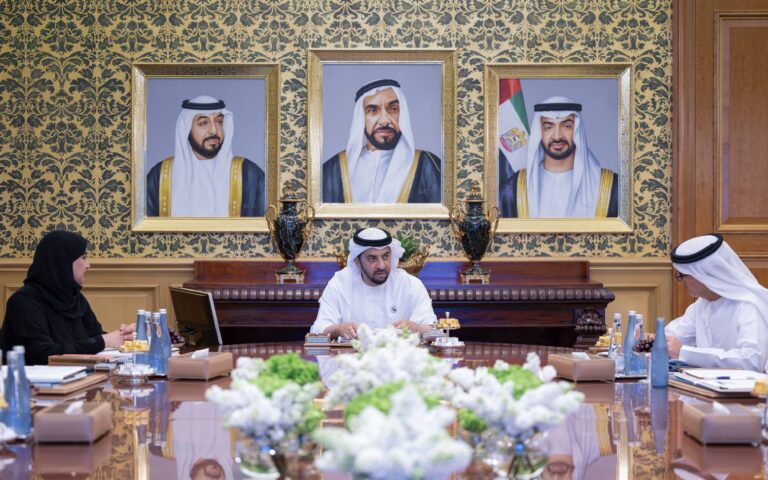H.H. Sheikh Hamdan bin Zayed Al Nahyan, Ruler’s Representative in Al Dhafra Region and Chairman of the Board of Directors of the Environment Agency – Abu Dhabi (EAD), has affirmed EAD’s commitment to preserving the environment and its biodiversity, as a unique natural heritage rooted in the conscience of the people of the UAE, reinforced by their close relationship with the environment and its natural resources.
With the environment constituting an essential part of the UAE national identity, and is one of the most important pillars of their culture and natural heritage, EAD’s commitment reflects its keenness to protect them to help enhance Abu Dhabi’s position and leadership in environmental work.
His Highness’ statement came in conjunction with World Environment Day as he chaired a meeting of EAD’s Board of Directors, where His Highness praised the unlimited support and attention that EAD receives from President His Highness Sheikh Mohamed bin Zayed Al Nahyan, who announced the extension of the Year of Sustainability to 2024.
His Highness stressed that this interest confirms the cultural orientation of the emirate of Abu Dhabi, which always seeks to ensure a healthy environment for all, and the concerted efforts of government agencies and private sector institutions to achieve the vision and direction of the wise leadership regarding sustainability requirements in all sectors.
The meeting, which was held at Nakheel Palace, was attended by Dr. Amna bint Abdullah Al Dahak Al Shamsi, Minister of Climate Change and the Environment, Dr. Mugheer Khamis Al Khaili, Chairman of the Department of Community Development (DCD), Staff Major General Pilot Faris Khalaf Al Mazrouei, Commander-in-Chief of Abu Dhabi Police, Mohamed Ali Al Shorafa, Chairman of Department of Municipalities and Transport (DMT), Razan Khalifa Al Mubarak, Managing Director of EAD, and Musabbeh Al Kaabi, Executive Director of Low Carbon Solutions and International Growth Directorate at ADNOC.
The meeting was also attended by Nasser Mohammed Al Mansouri, Under-Secretary of the Office of the Ruler’s Representative in Al Dhafra Region, and Dr. Shaikha Salem Al Dhaheri, Secretary-General of EAD.
During the meeting, His Highness was briefed on the agency’s plan to harness artificial intelligence in its environmental programmes by 2030, making it the first environmental entity to delve deeply into this field based on national expertise, global best practices, and multiple databases to achieve its environmental goals and provide advanced services to its partners and community members.
His Highness praised the results achieved in 51 annual key performance indicators during 2023, covering various environmental sectors, including waste, marine water quality, air quality, soil quality, biodiversity, sustainable fishing and groundwater. The results contributed to EAD winning five local and international awards during the first quarter of 2024, and the signing of seven local and international agreements.
The meeting also reviewed the performance of capital projects implemented by EAD during this year, which include the establishment of the Marine Museum in Saadiyat National Park, and the seed preservation centre project that will be established in Al Dhafra Region and is considered the first of its kind in the region.
The meeting reviewed the efforts made by EAD to implement the single-use plastic policy, which recently included the implementation of the ban on some Styrofoam products, which was enforced on 1st June 2024, with the aim of reducing reliance on products intended for single use that harm the environment and biodiversity.
During the recent period, EAD succeeded in avoiding the use of 324 million plastic bags since the start of the ban in June 2022, which is equivalent to approximately 95 percent of the number of plastic bags consumed before the ban. As part of the bottle recovery initiative, more than 1,000 tonnes of plastic bottles were collected through 120 machines spread across the emirate.
His Highness was briefed on EAD’s efforts in the field of protecting environmental quality, as the intellectual property rights for the environmental inspection system Eltezam were registered for the first time, which was launched in October 2022. It contributes to strengthening the agency’s regulatory role in preserving the environment and achieving sustainable growth in the emirate of Abu Dhabi. The first map was also issued identifying the most polluted areas based on mathematical modelling of the movement of air pollutants in Abu Dhabi, as well as in neighbouring countries.
During the meeting, the most prominent achievements achieved by the EAD this year in the biodiversity sector were reviewed, such as the coral reef rehabilitation project through which the cultivation of 819,580 colonies out of a million colonies was completed. The meeting also discussed a report on the first joint research mission with the Ocean X ship in the country’s waters, with the participation of several local universities and an elite group of UAE National researchers. The achievements made by the Marine Research Vessel Jaywun were also reviewed, which has travelled 7,540 nautical miles since its launch, as part of the fish resources assessment survey programme in the country’s waters, during which it sailed for 223 days and collected 3,103 fish samples.
His Highness praised the important role played by the EAD in hosting the 12th session of the World Environmental Education Congress (WEEC) for the first time in the Middle East, in which 3,131 participants from 83 countries from around the world participated during four days of active discussions, workshops and events.
During the conference, the Abu Dhabi Road Map was revealed, which is considered a high-level plan that outlined global recommendations to promote environmental education and education for sustainable development, with contributions from a group of organisations and institutions concerned with the field of environmental education.
These included the United Nations Educational, Scientific and Cultural Organization (UNESCO), the International Union for Conservation of Nature (IUCN), the United Nations Environment Programme, (UNEP), the Ministry of Education, Ministry of Climate Change and Environment (MoCCAE), Abu Dhabi Department of Education and Knowledge (ADEK) and the Abu Dhabi Early Childhood Authority (ECA), along with a group of international experts in the field of environmental education.
WAM



